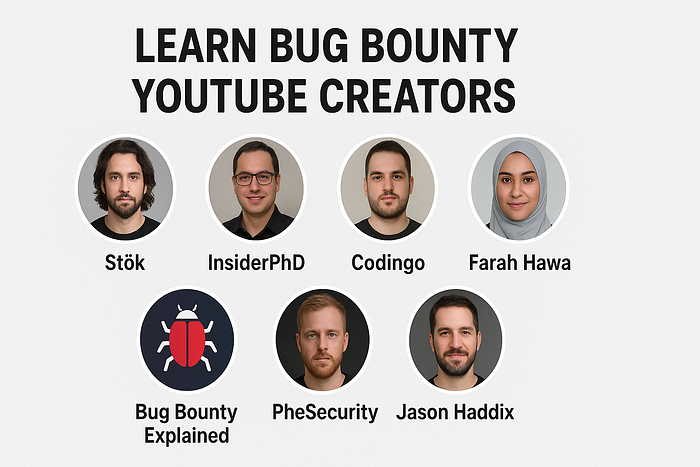Bug Bounty | Ethical Hacking
Outline:
· Who Am I · Free Resources to Learn Bug Bounties ∘ YouTube Creators ∘ Hands-On CTFs ∘ PortSwigger Web Security Academy ∘ Hacker101 ∘ Learn from Peers · Do You Need a Mentor · Key Advice Before You Start · — Bottom Line —
I started hacking in bug bounties in 2017 or 2018, so it has been more than eight years. During this time, I created content to help people learn about bug bounties. But I never made a clear guide on how to start..
In this article, I will share my background, free resources that you can use, advice from my own journey, and steps you should take before you start bug bounties.
Who Am I
My name is Muhammad Haider Tallal.
I started bug bounties because I wanted to learn and also build a strong resume to get a job after college. My university taught me C++ programming but there was no real security program. I had very basic computer knowledge. Bug bounties became my way to study real hacking.
At first there were not many resources. I was a complete beginner. But with practice I learned about different types of bugs, applied my knowledge, and started making money.
I want to share this because I want you to know that I started with very little. If I could do it then you can also do it.
Free Resources to Learn Bug Bounties
There are many free tools and platforms that can help you start today. Here are some of the best ones.
YouTube Creators
You can watch:
1. Stök
2. InsiderPhD,
3. Codingo
4. Farah Hawa
5. Bug Bounty Explained
6. PheSecurity
7. Jason Haddix
They share good tutorials and real examples. YouTube is a good first step for practical learning.

Hands-On CTFs
You can try PicoCTF. It does not only teach exploitation but also basic skills like curl, regex, headers, and DOM use. These skills are very useful in daily hacking.
PortSwigger Web Security Academy
This is one of the best free places to learn web vulnerabilities. It gives you labs, guides, and examples on XSS, CSRF, SSRF, and many more. The labs give you practice so you can later find these bugs in real websites.
Hacker101
HackerOne created this platform. It lets you practice on small applications. You do not know the bugs in advance so it feels more real. If you complete enough challenges then you can receive invites to private programs on HackerOne.
Learn from Peers
Follow bug bounty hunters on Twitter and also read their blogs. You can follow Sam (Zlz), Brett (Zayed), and Vickie Li. Their posts explain complex ideas in simple words.
Do You Need a Mentor
Many people ask if they need a mentor. In my opinion, there are three kinds of mentors that can help you.
The first is someone ahead of you. This is an experienced hunter or content creator. You can follow their work and learn from them.
The second is someone at your level. This is a peer who learns with you. You can share your work and improve together.
The third is someone behind you. This is a beginner who you can teach. Explaining ideas to others will help you understand more deeply.
For me, collaboration was very important. I worked with hunters like Brett (Zion) and later joined groups of peers. We learned from each other. Teaching people on YouTube also made me stronger.
Key Advice Before You Start
These are some lessons I wish I knew earlier.
Set clear goals. For example, decide to learn XSS and measure progress by finding three valid XSS reports.
Focus on a few bug types first. You can begin with XSS, IDOR, and SSRF. These bugs have many forms and they will help you build skills.
Avoid automation at the start. Do not depend on tools like Nuclei or HTTPx. Learn to find bugs manually first.
Choose the right targets. Try big programs with many applications. If not, go to VDPs like IBM, DOD, GM, or Ford. Sites with user registration or file upload are good choices.
Repeat the process. Go deep into one target. When you stop making progress then move to another one. Over time you will enter private programs with more rewards.
It only takes one good program to break through. Once you succeed you will get more invites and you will continue to grow.
— Bottom Line —
This is my guide to starting bug bounties. Learn from free resources, work with peers, set clear goals, and practice often.
Bug bounties are not based on luck. They need patience, practice, and persistence.

